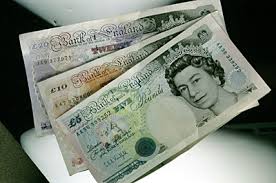Monday, 12 October 2015 20:05
 LONDON: Sterling climbed towards a two-week high against the struggling dollar on Monday, as investors cut bets in favour of the greenback on growing confidence that the Federal Reserve will not raise interest rates anytime soon.
LONDON: Sterling climbed towards a two-week high against the struggling dollar on Monday, as investors cut bets in favour of the greenback on growing confidence that the Federal Reserve will not raise interest rates anytime soon.
And while that has pushed back chances of the first rate hike in the UK to well into late 2016, recent comments from Bank of England Governor Mark Carney, who said the bank is not bound to wait for a move in US interest rates before it raises its own, was offering the pound support.
BoE policymaker and noted hawk Martin Weale said, in a speech on Monday, that there were tentative signs that improved business confidence in the UK was leading to higher productivity, highlighting a labour market that was tightening gradually.
Nevertheless, with headline inflation anchored near zero, the debate over whether to raise interest rates is likely to be robust in the coming quarter, traders said.
Inflation for September is due on Tuesday, and is likely to show the annual reading was steady 0.0 percent, unchanged from a month ago.
Sterling was up 0.3 percent at $ 1.5360, not far from a two-week high of $ 1.5382 struck on Friday.
The dollar languished near a three-week low versus a basket of major currencies with Fed vice-chair Stanley Fischer the latest to sound mixed on the chances of a hike by December.
The euro was down 0.1 percent at 74.05 pence. “Repeated comments from BoE policymakers that they still intend to raise interest rates over the next year will prevent the pound from an aggressive period of weakness, but another weak inflation reading might also remind traders the BoE will not be raising rates until at least the second half of 2016,” said Jameel Ahmad, chief markets strategist at FXTM.
Sterling has been underpinned for most of this year by expectations the BoE would follow the Federal Reserve in raising rates, but that view has been challenged given a global slowdown. But recent data has shown that British growth may be slowing.
The country also racked up a larger than expected trade deficit in August, while construction output surprised by sinking in both annual and monthly terms.
Last week, the International Monetary Fund cut its global growth forecasts for a second time this year and also trimmed prospects for Britain. It now expects the UK economy to grow at 2.5 percent in 2015 and 2.2 percent in 2016.
Still, the British economy is expected to outperform other major economies, a factor that should help the currency.
“We prefer buying dips in the pound with the UK much further from easing than other major central banks, holding a yield advantage,” said Josh O’Byrne, currency strategist at Citi.




























